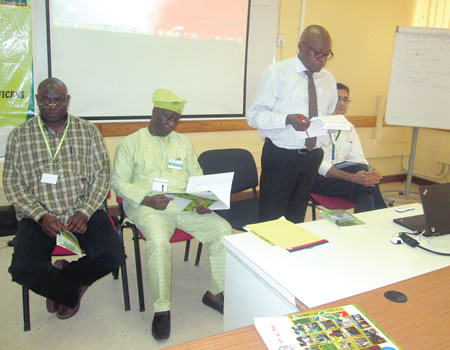Stakeholders in the agricultural sector have reiterated their commitment to ensuring food security in Nigeria, and on a global scale, especially as it relates to the country’s role as the major producer of cassava worldwide.
This as the submission at the National Agriculture Seeds Council (NASC) Cassava Seed Certification Training Workshop for the South-West region, held at the International Institute of Tropical Agriculture (IITA) Training Centre, Ibadan, Oyo State from February 5th till February 7th, 2017.
Speaking on the theme, “Building an Economically Sustainable, Integrated Cassava Seed System (BASICS),” it was noted that Nigeria’s significant role in ensuring food security within and outside its shores could not be overemphasised.
In his address, the Director General of NASC, a parastatal under the Federal Ministry of Agriculture and Rural Development, Dr Philip Ojo, who noted that while the workshop set out to “address the lingering problem and the weak link of the value chain of the seed system,” the purpose of the workshop was for participants to acquire the needed skills for the certification of cassava seed, and ensure exposure to the use of cassava tracking system, which was an innovation of a team of IITA scientists led by Dr Lava Kumar.
The event featured presentations on Seed Certification and Quality Assurance Process in Cassava Seed Production by the Deputy Director, Seed Certification and Quality Control, NASC, Mr Ishiak Khalid; Agronomy, Stem Production Handling and Management by Mr A.T. Efuntoye; Cassava Varieties: Varietal Identification and Characteristics by P. Kulakow and P. Iluebbey of the IITA; Cassava Seed Tracker – Introduction and Programme Installation in Mobile Devices by Dr Lava Kumar and B. Ogunya of the IITA.
There were also practical sessions on pest and disease identification using the IITA cassava field; seed field inspection and reporting using traditional method and cassava seed tracker; demonstration of seed field inspection, among others.
Speaking on the varying performances of cassava in the nation, Dr Ojo stated that “despite all the laudable strides in developing the country’s potential in cassava production, cassava seed value chain remains one of the weakest links – the planting material, being very cumbersome to transport and the dearth of information as to its viability. This challenge has been a recurring bottleneck to the full actualisation of the potentials of cassava in Nigeria.
“Cassava is unarguably a prime crop, Nigerian being the largest producer in the world; therefore the introduction of enhanced and properly certified seed system is a plus to this development. The dream of an effective and efficient seeds system in the cassava seed system is now here, the cassava tracker will address a long-term knotty issue in the cassava seed system. This seamless communication platform will engender effective traceability capacity, inventory management and good regulatory control of seeds which the agency stands for.”
In his presentation, Mr A.T. Efuntoye highlighted the importance of cassava, just as he lamented that at N30,000 per tonne, it was sad that rather than acting as a poverty-alleviation crop for farmers, it had rather become a crop that aggravated poverty.
Efuntoye advocated the promotion of cassava as an economically sustainable crop and called for adequate training and sensitisation.
Another facilitator, Mr Ishiak Khalid, called for more proactive measures for the production of quality cassava. While highlighting the requirements for seed certification, he noted the importance of stakeholders working with organisations such as the NASC in making available quality seeds for certification, stating that it was important to reiterate the need to follow due process in seed certification to avert the consequences of bypassing formal certification, which could result in importation of pests and low quality seeds, among other negative outcomes.
WATCH TOP VIDEOS FROM NIGERIAN TRIBUNE TV
- Let’s Talk About SELF-AWARENESS
- Is Your Confidence Mistaken for Pride? Let’s talk about it
- Is Etiquette About Perfection…Or Just Not Being Rude?
- Top Psychologist Reveal 3 Signs You’re Struggling With Imposter Syndrome
- Do You Pick Up Work-Related Calls at Midnight or Never? Let’s Talk About Boundaries







